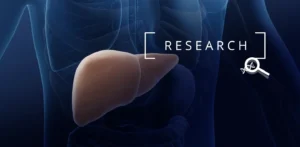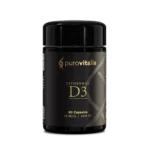
We know vitamin D as the “sunshine vitamin” that supports bone strength, immunity, and overall vitality. But new scientific evidence suggests it may also play a role in how we age at a cellular level.
A major new study from 2025 published in The American Journal of Clinical Nutrition examined whether daily vitamin D3 (2,000 IU or 50 micrograms) could slow biological aging by protecting a key marker of cellular health — telomeres.
table of contents
What are telomeres?
Before we look at what the researchers discovered, let’s first understand what telomeres are, what happens to them as we age, and why they matter so much.
Telomeres are almost always referred to as the “plastic tips on shoelaces.” They cap the ends of our chromosomes, keeping our DNA stable and preventing it from unraveling or sticking to other genetic material.
Each time a cell divides, its telomeres become a little shorter. Over the years, this gradual shortening leads to cellular aging — a process called senescence, where cells stop dividing and lose their ability to function optimally.
When telomeres become critically short, cells either die or enter a dormant state. This decline contributes to both visible and invisible signs of aging — such as wrinkles and sagging skin, as well as slower tissue repair and a higher risk of chronic disease.
Related: What are zombie cells and how to get rid of them?
The science behind telomeres
Nobel Prize–winning scientist Elizabeth Blackburn, co-author of The Telomere Effect, revealed how lifestyle factors such as nutrition, stress, and physical activity can influence telomere length and, ultimately, our biological aging process. Her discoveries opened the door for a growing field of research exploring how everyday choices — from what we eat to how we move — can affect the rate at which our cells age.
Building on this understanding, researchers have since turned their attention to specific nutrients that might help protect telomeres. One nutrient that continues to attract scientific interest is vitamin D, known not only for its role in bone and immune health but also for its potential influence on cellular aging.
The study
A recent U.S. clinical trial set out to investigate whether vitamin D, alongside omega-3 fatty acids, could play a role in supporting long-term health and possibly slowing biological aging.
- Published in: The American Journal of Clinical Nutrition (2025)
- Participants: 25,871 adults (men aged 50+, women aged 55+)
- Sub-study size: 1,054 participants followed for four years
- Design: Randomized, double-blind, placebo-controlled
- Interventions: Participants were randomly assigned to one of four groups:
| Group | Supplement | Daily dose |
|---|---|---|
| Vitamin D3 group | Vitamin D3 | 2,000 IU (50 µg) |
| Omega-3 group | Omega-3 fatty acids (EPA + DHA) | 1 g |
| Combination group | Vitamin D3 + omega-3 fatty acids | 2,000 IU (50 µg) + 1 g |
| Placebo group | Placebo | No active supplement |
- Measurements: Blood samples were collected at baseline, year 2, and year 4 to measure leukocyte telomere length (LTL) — a key indicator of cellular aging.
Participants were healthy at the beginning of the study, and neither they nor the researchers knew who received vitamin D, omega-3, or placebo. This ensured fully unbiased results.
The purpose
The aim was simple yet significant:
Could consistent vitamin D3 or omega-3 supplementation reduce telomere shortening — and, in doing so, slow the biological aging process?
The findings
After four years, the results clearly showed an advantage for vitamin D3.
| Supplement group | Change in telomere length after 4 Years | Result |
|---|---|---|
| Vitamin D3 (2,000 IU / 50 µg daily) | 0.14 kilobase pairs less telomere loss (~140 base pairs preserved) | Significant reduction in telomere shortening |
| Omega-3 (1 g daily) | No significant difference vs. placebo | Not significant |
While the Omega-3 group did not show any measurable effect on telomere length, the participants taking vitamin D3 preserved around 0.14 kilobases (140 base pairs) more of telomere DNA compared to those on placebo. The researchers describe this as a significant reduction in telomere shortening over the four-year period.
While the study does not translate this number into years of biological aging, it highlights that such preservation is biologically meaningful. Telomeres typically shorten gradually as part of the normal aging process, so even a small reduction in this loss suggests a slower rate of cellular aging and better maintenance of DNA stability over time.
Who benefited most
The benefits of vitamin D3 were especially strong among:
- Participants younger than 64 years
- Non-smokers
- Those with a BMI below 30 (not obese)
- Participants with low vitamin D levels at baseline
- Individuals not taking cholesterol-lowering medication (statins)
Participants using statins showed no significant benefit, possibly because these medications reduce the body’s response to vitamin D.
How vitamin D3 may protect telomeres
The researchers highlighted several biological mechanisms that could explain vitamin D3’s protective effect on telomeres:
Activating telomerase:
Vitamin D may boost the activity of telomerase — the enzyme that rebuilds telomeres by adding new DNA sequences.
In earlier work by the same group, vitamin D supplementation increased telomerase activity by 19% within 16 weeks.
Reducing inflammation:
Chronic inflammation is one of the main drivers of telomere shortening.
Vitamin D interacts with inflammatory pathways such as NF-κB, helping lower cellular stress and maintain DNA stability.
NF-κB (nuclear factor kappa B)
A protein complex that regulates gene expression involved in inflammation, immune response, and cell survival. When overactivated, it contributes to chronic inflammation and age-related diseases.
Protecting against DNA damage:
Telomeres are highly sensitive to oxidative stress.
Vitamin D helps repair DNA and reduces oxidative damage, allowing cells to better preserve their telomeres.
Supporting immune longevity:
As telomeres shorten, immune cells age — a process called immunosenescence.
By supporting immune regulation and reducing inflammation, vitamin D may help immune cells stay functional for longer.
What it means for aging
This study offers strong evidence that vitamin D3 can slow cellular aging by preserving telomere length.
Participants who took 2,000 IU (50 µg) of vitamin D3 daily experienced significantly less telomere erosion, indicating a slower biological clock.
In other words
Maintaining longer telomeres means that cells can divide and repair for longer — potentially delaying the onset of age-related diseases and supporting overall longevity.
Why liposomal vitamin D3 matters
The study used a standard vitamin D3 supplement, but absorption is a crucial factor.
Traditional capsules often lose potency as they pass through the digestive system, reducing how much vitamin D the body can actually use.
Liposomal technology changes that. Each molecule of vitamin D is encapsulated in microscopic lipid spheres called liposomes, which:
- Protect the vitamin during digestion
- Improve absorption and bioavailability
- Provide steadier and longer-lasting levels in the bloodstream
This means more of the vitamin reaches your cells — supporting optimal vitamin D status and, as this study suggests, potentially helping to protect your DNA and slow biological aging.
Get your liposomal vitamin D3 here.
Final thoughts
This four-year clinical study provides compelling evidence that vitamin D3 — at a daily dose of 2,000 IU (50 µg) — can help preserve telomere length, a central marker of biological aging.
Omega-3s continue to offer many other health benefits, but when it comes to protecting DNA and slowing cellular aging, vitamin D3 stands out.
With the enhanced absorption of liposomal vitamin D3, maintaining healthy vitamin D levels becomes more effective than ever — a simple, science-backed way to support your cells, your immunity, and your longevity.
References
- Zhu H, Manson JE, Cook NR, Bekele BB, Chen L, Kane KJ, Huang Y, Li W, Christen W, Lee I-M, Dong Y. Vitamin D3 and marine ω-3 fatty acids supplementation and leukocyte telomere length: 4-year findings from the VITamin D and OmegA-3 TriaL (VITAL) randomized controlled trial. Am J Clin Nutr. 2025 Jul;122(1):39–47. doi:10.1016/j.ajcnut.2025.05.003

Vitamin D3 2000 IU liposomal delivery maximum bioavailability Immune Enhancer
Strengthen your immune system and promote bone health with Liposomal Vitamin D3! Try it out!

Track 50+ health metrics with AI-powered accuracy. Start your free trial today and take control of your wellness journey!

longevity tips best exercises nutrition diets healthy lifestyle
The art of living well a life that’s not measured by years alone, but by experiences, health, and joy!













